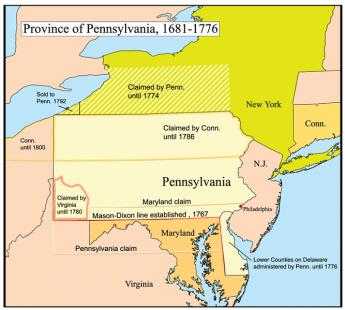Related Topics
Benjamin Franklin
A collection of Benjamin Franklin tidbits that relate Philadelphia's revolutionary prelate to his moving around the city, the colonies, and the world.

Articles of Confederation
The Articles of Confederation were written by John Dickinson, modified by others. Officially unratified for five years, the country was ruled under them in Philadelphia, for thirteen. They taught many lessons, which we sometimes forget we had experienced.
A Minor Politician
In 2013 I ran for the New Jersey Assembly, unsuccessfully. Daughter Miriam was my campaign Manager. I learned a lot from the experience. For example, I had 700,000 constituents. Maybe I shook hands with a couple hundred.
Boundary Disputes

|
| Four Corners of Pennsylvania |
When you talk boundaries, a good lawyer is what you need. Pennsylvania had the best in William Penn. Prior to 1776, the boundaries between the American colonies were settled in London, either by the King or the British courts. After 1787, disputes over boundaries were settled in the United States Federal Courts, acting under Section III of the Constitution. Generally speaking, boundaries were first created by treaties, by Kings, and by Congress. Boundary disputes were then settled in the courts, first in England, and later in Federal Courts. Between 1776 and 1787, however, the Articles of Confederation governed. The immediate problem was that the Articles were not finally ratified until 1781. A technical problem was that surveying instruments were improving during this period. The judicial problem was that a body of law was evolving about when to use the deepest channel of a river or when to use the half-way point between the two banks of a river, and when to use just one bank of the river or the other. And the political problem was that major immigration made everyone less care-free about boundaries of the land which were steadily growing more valuable. The American period under the Articles of Confederation was one big argument about state borders.
A century earlier, when British kings were handing out charters to those adventurous enough to accept them, there was plenty of cheap lands if someone could defend it. The common approach to granting charters was to pick two points along the Atlantic, and from there to extend lines westward as far as they could go. When the lines bumped into lines given to other colonies, there were countless lawsuits and occasionally little wars. Only the three Quaker colonies of New Jersey, Pennsylvania and Delaware were formed late enough in the colonial period to enjoy practical ways even to define a western border. Virginia, the largest colony, officially extended itself to include what is now Kentucky and West Virginia, and had reasonably defensible claims to all the land of the Northwest Territory, on the western side of the defined Pennsylvania western border, all the way north to the Great Lakes. When the Indians finally woke up to what was happening, they rebelled under the leadership of Pontiac and Tecumseh and were helped in their massacres of white settlers by the French, later by the British. Peaceful rectangular Pennsylvania experienced armed nibbles at each of its four corners; from Maryland in the southeast, Virginia in the southwest, Connecticut in the northeast. On its northwestern corner, Pennsylvania had the award of the Erie connection to the Great Lakes to settle an overlapping conflict between Connecticut and New York. The Articles of Confederation, composed mostly with common defense against England in mind, were deliberately inadequate to govern disputes between allies within the revolters. Discovering remarkable subsidence of such disputes after the installation of the Constitution, this might well have become a major reason for replacing the Articles of Confederation if it had been foreseen. But that was scarcely the case. The American colonists simply had no idea the Union would make such disputes immediately seem trivial if still remaining fairly numerous. When the advantages of peaceful unification are considered by other nations on other continents, consideration really should highlight the sense of delight America felt at the discovery of this unexpected bounty. At a minimum, it helped us ignore the many fumbles we also experienced.
Originally published: Thursday, August 30, 2012; most-recently modified: Wednesday, August 14, 2019